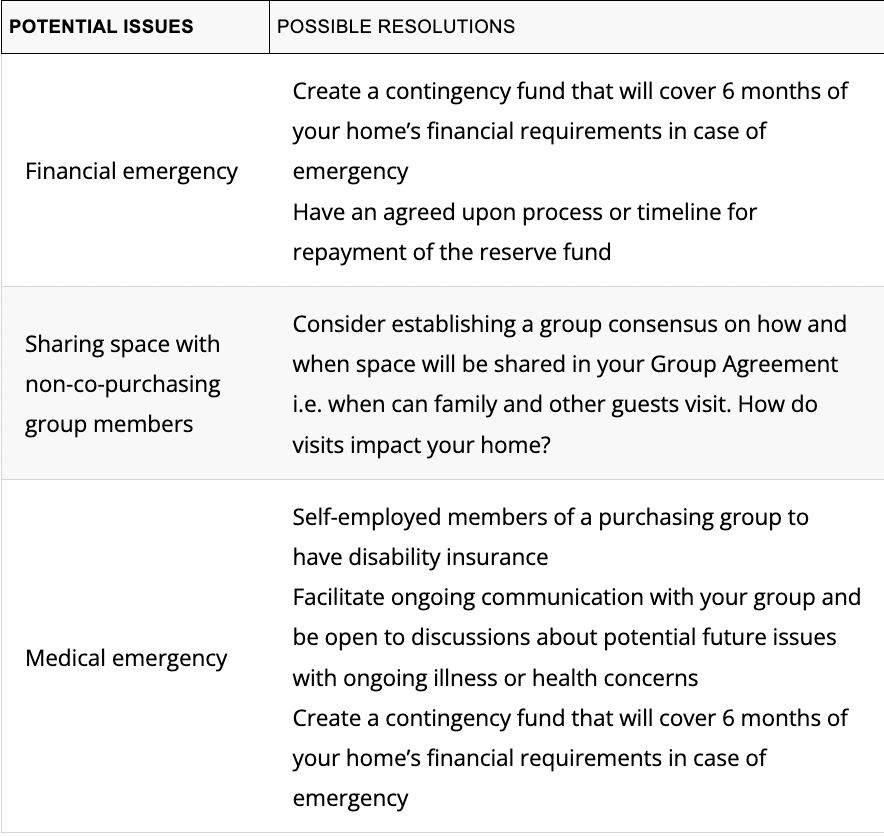Creating Your Co-Ownership Guidelines: Conflict Resolution Strategies

Conflict can happen even in the most amicable arrangements. Being able to resolve conflicts and disagreements is an important skill in co-living arrangements. Just like any relationship, your group should have methods for resolving conflicts—ideally as they arise, and even if the conflict is minor.
There is no one method for conflict resolution that will work for every group. It is up to you and your purchasing group to work out what method or methods will suit you. Having an agreed-upon collective decision-making structure and communication system will lay the foundation for your group to deal with conflict successfully.
In addition to open and regular communication, and an agreed-upon model for collective decision-making, here are a few ideas for resolving potential issues:

Strategies for Effective Conflict Resolution
- Regular Communication: Regular communication and pre-emptive discussions around smaller issues before they become large conflicts are the most effective ways to resolve disputes.
- Decision-Making Models: Establish a decision-making model, such as group consensus or majority vote, for major decisions to ensure everyone's voice is heard.
Building on your mission statement and your Co-ownership Guidelines drafted previously, review the following scenarios with your group and discuss how you would resolve the potential conflicts that they pose. Some of the scenarios might not be relevant to you—feel free to pick and choose which scenarios you want to discuss. Don’t forget to think of potential scenarios that pertain specifically to your group!
Conflict Scenarios and Resolutions
Scenario 1: Renovation Disagreement
Your roof requires a major renovation. One of your group members wants their uncle to do the renovation because it would be cheaper, but the other members of your group would rather seek out professional companies and get quotes through them.
Suggested Resolution: Have a set decision-making model for large future capital expenditures such as renovations. To prevent any conflict, the group could explore quotes from both professional companies and the member’s uncle and make the decision based on a majority vote.
How would your group resolve this issue?
Scenario 2: Missed Chore Rotation
You have a rotating schedule between two of your household members to take out the garbage each week. One of the members often misses their rotation without warning or explanation, causing garbage to pile up for the other member.
Suggested Resolution: Have a group meeting to discuss and redistribute household chores. Have the group member responsible set a reminder to not miss their rotation.
How would your group resolve this issue?
Scenario 3: Uneven Renovation Costs
There are three separate units in your four-person household: two members share one unit, and the other two members each have their own unit, complete with their own kitchen and bathroom. One of the single unit members wants to renovate their kitchen. They want the expense to be distributed evenly across the group as it will bring the property value up for everyone. The other group members don’t want to pay the expense to renovate a single kitchen.
Suggested Resolution: Have a set agreement in place for large capital expenditures such as renovations. For example, you could have an agreement that if a renovation affects the entire household functionally, then it’s an expense that can be distributed across the members, but if it is a cosmetic upgrade, the cost will fall to the individual(s) in the renovated unit.
How would your group resolve this issue?
Scenario 4: Missed Mortgage Payment
One of your group members fails to make their contribution for the monthly mortgage payment, leaving the rest of the group liable to make up the cost or default on the payment.
Suggested Resolution: Have a buffer fund that everyone contributes to. This fund should be able to cover up to six months of monthly expenses, including the mortgage payment. Additionally, have a due date for the monthly funds to be compiled prior to the mortgage due date to allow time in the event of funding issues.
How would your group resolve this issue?
Scenario 5: Create Your Own
Make up your own! What is a conflict scenario that you can imagine your group encountering? How would your group resolve it?
Now that you’ve discussed conflict resolution, it’s time to move on and see a few case studies before we finish Step 3!
How Do You Create Your Co-Ownership Guidelines?
Click on the sections below to learn more.
- Creating Your Co-Ownership Guidelines: Getting Started
- Creating Your Co-Ownership Guidelines: Identifying Shared Goals
- Creating Your Co-Ownership Guidelines: Collective Decision Making
- Creating Your Co-Ownership Guidelines: The Power of Communication
- Creating Your Co-Ownership Guidelines: Conflict Resolution
- Creating Your Co-Ownership Guidelines: Real-Life Case Studies
